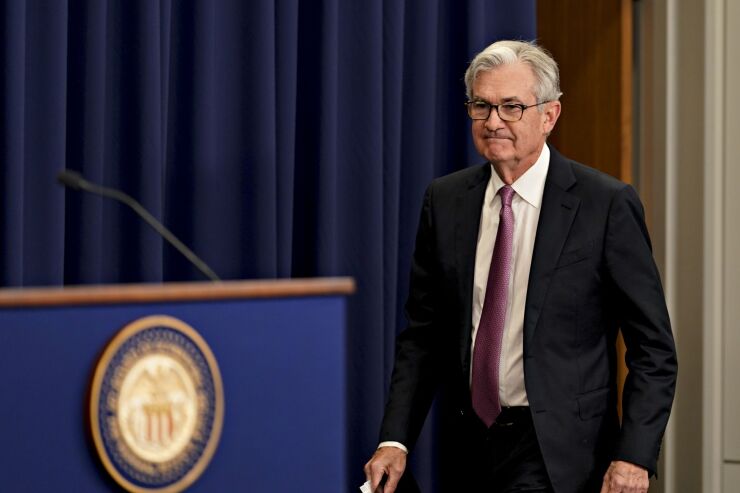WASHINGTON — Jerome Powell was confirmed to his second four-year term as chairman of the Federal Reserve Board of Governors by a vote of 80-19 in the Senate on Thursday.
Powell is the third Federal Reserve nominee to emerge from the confirmation process this week. Philip Jefferson, a former Fed economist and administrator at Davidson College, soared through by a vote of 91-7 on Wednesday night, while Lisa Cook was confirmed on a party-line vote of 51-50 on
Four of President Biden’s five Fed nominees for the seven-member board now have Senate approval after an arduous and protracted confirmation process. The White House rolled out its slate of nominees in December and January, only to see their progress stalled in the Senate Banking Committee amid concerns over past statements by Sarah Bloom Raskin, the administration’s initial pick for the Fed’s vice chair for supervision.

Republicans on the committee took umbrage with Raskin’s past advocacy for blocking energy companies from emergency credit facilities offered by the Fed following the initial financial shock of the COVID-19 pandemic. They
The White House has since picked
Powell was appointed to the Board of Governors by President Barack Obama in 2012 then reappointed in 2014. President Donald Trump tapped him to lead the Fed after then-Chair Janet Yellen’s term expired in 2018. Powell had been serving as acting chair since his term expired this past February. Wednesday’s vote showed Powell still enjoys support from both sides of the aisle despite the heightened political tension around presidentially-appointed regulators.
Both Sens. Sherrod Brown, D-Ohio, and Pat Toomey, R-Penn., the ranking members on the Senate Banking Committee, lauded Powell’s confirmation Thursday afternoon.
Brown said the wide margins by which Powell and Jefferson confirmed demonstrated their broad appeal. He added that he expects all the new board members to advance the Biden administration’s agenda while remaining politically neutral.
“I am confident all of the president’s nominees will fiercely guard the Fed’s independence, work to bring down prices, and put workers, not Wall Street, at the center of our economy,” he said in a statement.
Toomey praised Powell’s record of scaling back bank regulations during the early years of his chairmanship and his swift efforts to support the U.S. economy at the onset of the pandemic. Yet, Toomey also criticized Powell and the Fed for its monetary policy decisions amid skyrocketing inflation.
“While I strongly disagreed with Chairman Powell’s decision to continue the Fed’s emergency accommodative monetary policy long after the economic emergency had passed, I have been encouraged by the Fed’s recent shift in policy,” he said in a statement. “It’s quite possible, however, that the Fed may need to accelerate monetary tightening because it was so late to change course. I hope Chairman Powell and his colleagues at the Fed will move swiftly to ease the inflation tax that’s plaguing American families every day.”
Other Republicans were less forgiving of perceived missteps on the part of the Fed. Sen. Richard Shelby, R-Ala., took to Twitter after voting no on Powell’s nomination to chastise the chair. “American families are facing rampant inflation and historically high prices,” he tweeted. “Powell and the rest of the Fed have failed the American people. We should not reward failure.”
Some of the 19 votes against Powell also came from Democrats, including Sens. Elizabeth Warren, D-Mass., and Bernie Sanders, D-Vt., leaders of the party’s progressive wing. Sen. Bob Menendez also voted no, citing the Fed’s decision to not hire Latin American candidates for the open president roles at the Dallas and Boston Feds.
“They could have sent a message to the 62 million Hispanic-Americans in the United States that they too deserve a seat at the table where our nation’s most important economic decisions are made,” Menendez said in a statement. “Unfortunately, the Federal Reserve opted to continue the shameful 108-year legacy of Latinos being left out of the Federal Reserve’s leadership.”
Reserve Bank presidents are selected by the members of each individual bank then approved by the Fed Board of Governors.
Powell attended Princeton University for his undergraduate degree and Georgetown University Law School. Before joining the Fed, he was a visiting scholar at the Bipartisan Policy Center. Before that, he was a partner at the Carlyle Group, a private equity firm based in Washington.
Jefferson holds a bachelor’s degree from Vassar College and a doctorate from the University of Virginia. Aside from his brief stint at the Fed, he has spent most of his career in academia, working at Columbia University, the University of California, Berkeley and Swarthmore College before joining Davidson College as vice president for academic affairs and dean of faculty in 2019.
Jefferson is the fourth Black man to be confirmed to the Fed. After Cook became the first Black woman to be appointed a Fed governor, Jefferson’s confirmation marks the first time the central bank will have two people of color on its governing board.





